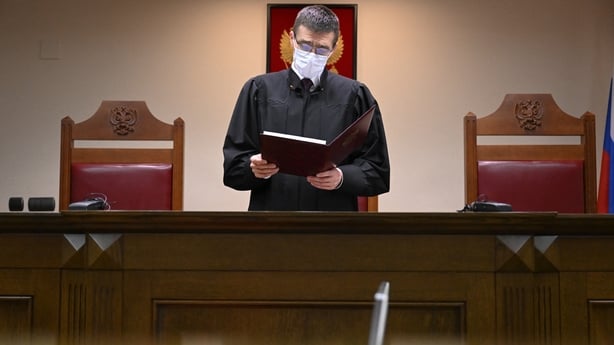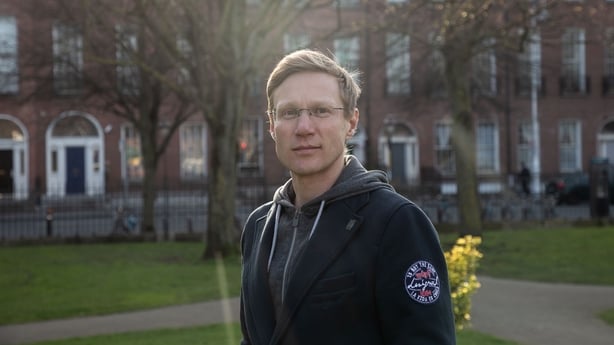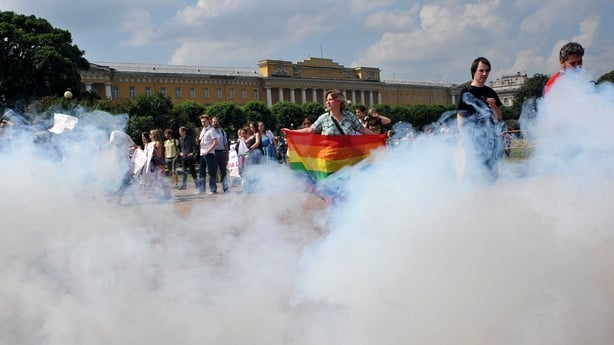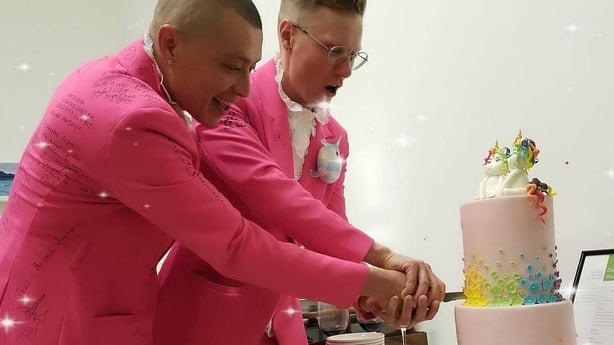Just like in Ireland, homosexuality was decriminalised in Russia 30 years ago.
But, while Ireland has since moved toward acceptance and even the legalisation of same-sex marriage, in Russia things have gone the other way.
This week, Russia's Supreme Court issued a ruling that will effectively outlaw all advocates of gay, lesbian and transgender rights in the country.
The Moscow court approved a request from the justice ministry to ban activities of what they called "the international civic LGBT movement" - a broad term that could potentially ensnare any LGBTQ+ representative in Russia.
The UN Human Rights Office said that, when the law comes into force in January, the situation for LGBTQ people will be "going from bad to worse".
"It is scary when you know that anyone - a friend, an enemy or a neighbour - is able to use this legal tool against you, simply because they know that you belong to the LGBT community," said Dr Alexander Kondakov, and assistant professor at the UCD School of Sociology and whose research focuses on violence against queer people in Russia.
Dr Kondakov said the development would now make him fearful of returning to Russia.
Things did not always look so hopeless.

In the 1990s and early 2000s, there was a brief moment when Russians were more tolerant, more permissive. Tatu, the female duo which rose to international stardom when they released a music video that featured them kissing, was even allowed to represent Russia at the Eurovision.
But it later emerged that their "queerness" was a marketing trick conceived by their producer - and both women explicitly distanced themselves from the LGBT community.
Soon after, the Kremlin launched its crusade against gay people. In 2013, it banned the "propaganda of non-traditional sexual orientations" to children in movies, books or advertising. Last year, that law was expanded to all ages.
The law has led to widespread censorship of western films and TV shows, when any mention of same-sex relationships would be cut or falsely translated. Such "adjustments" were noticed in series like Sex and the City and Game of Thrones.
In July of this year, Russia introduced a complete ban on gender reassignment surgery along with a ban on changes to gender markers in documents.
But this week’s Supreme Court ruling has taken things that step further - and means that LGBT activists could be labelled as "extremists".
Dr Kondakov said the ruling wasn’t unexpected. But he said that it has been met with fear by Russia’s queer community.
He said that while the police have not started knocking on people’s doors, people feel like the Russian government has entered their bedroom.

The vagueness of the ruling suggests that anyone could be classified as an activist. Posting a rainbow flag online, coming out on social media or simply expressing support for LGBT rights could become a reason for criminal persecution of any individual.
Like in the Soviet Union or Nazi Germany, Dr Kondakov said the law will further stoke fears in the society and help turn citizens against each other.
In a country where homophobia is celebrated by government officials, fearing your neighbour doesn’t feel like an overreaction, he said.
On the day of the ruling, some Muscovites expressed unequivocal support for the Supreme Court’s ruling.
One man told Reuters that "all this sodomy" is not OK and is alien to Russia’s "traditional values", while another resident said homosexuality was not normal and that and all his friends "share a negative attitude" towards it.
Russian President Vladimir Putin has been promoting himself domestically as a guardian of "traditional values", accusing the West of adopting "rather strange, new-fangled trends like dozens of genders, and gay parades".
The anti-western rhetoric has proven even more useful since Russia’s invasion of Ukraine. The war has exacerbated Russia’s "systematic crackdown on civil society", Ireland’s permanent representative to the UN Geneva office said at a Human Rights Council session last month.
"It’s clear that external aggression and internal aggression go hand in hand," Noel White told members.

Dr Kondakov believes the increasing crackdown on civil liberties is part of the Kremlin’s efforts to consolidate power and unite his conservative electorate against a common "enemy".
"When there is no positive political agenda, like building hospitals or improving social welfare," he said, "scapegoating becomes an alternative source for political legitimacy, especially in non-democratic states".
But Dr Kondakov said that there would not be a mass exodus from Russia, because leaving is not an option for many people.
"There is always that girl, that boy, that non-binary person who suddenly understands that they are different. But they won't be able to pack a bag and leave," he said.
"It's children who are confused who will suffer the most from this ban. They will look at the world around them and understand that something is different about them – that the difference is not appreciated by the government of the country where they happened to have been born."
Amid the lack of escape routes, Dr Kondakov said he feared a surge in suicide rates among teenagers.
'In Ireland, I feel calm'
Dr Kondakov and his partner, Evgeny Shtorn, have been together for almost 20 years.
He recalled their life in St Petersburg in the early 2000s when gay communities were thriving, and a same-sex couple could live comfortably and openly.
"The future seemed bright," he said.
But things took a darker turn.
Mr Shtorn, a prominent LGBT activist in St Petersburg, had to flee Russia in 2018 after an attempt by the secret service to recruit him as an informant.

He ended up in Ireland and claimed asylum here. Dr Kondakov also moved to Ireland to continue his research career at UCD.
This year, the couple got married in Dublin. But they are all too aware that doing so feels like a distant prospect LGBT people in Russia.
Dr Kondakov last visited his native Russia three years ago. He is not planning to return any time soon, amid fears for his security.
"I’m sad that my country is such a tough place for so many people. In Ireland, I feel calm. Not necessarily happy - it's too strong of an emotion - but calm."
He said that this feeling of calm is what he and other queer people in and outside Russia are craving.
"To feel that nobody’s persecuting you, nobody's after you - neither your neighbours, nor the government," he said.
"To feel that you can just focus on building your own life. But to the LGBT people in Russia, that feeling is simply out of reach."







